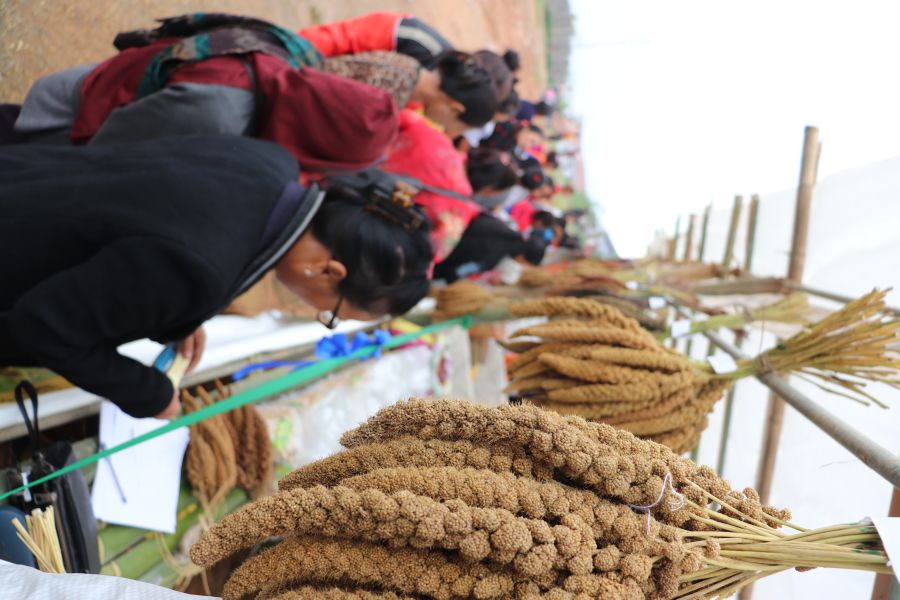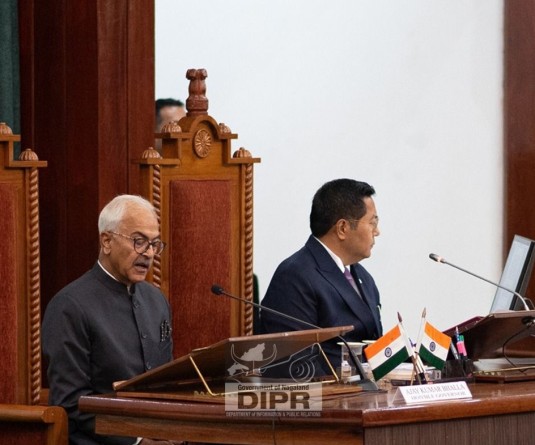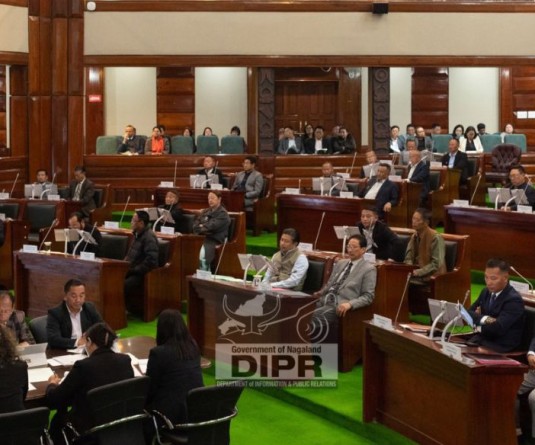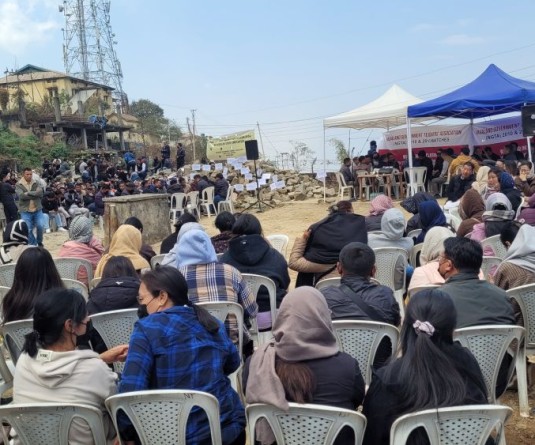A cultural performance by a troupe from Shiponger village during the Millet Festival in Shamator.
SHAMATOR, AUGUST 6 (MExN): “A part of our culture is lost with the loss of a crop”, said Wekoweu Tsuhah, State Coordinator, NEN as she addressed the 3rd Millet Festival which was celebrated at Public Ground, Shamator town on August 5.
The festival was organised by Self Employed Women’s Association (SEWA), Millet Network of India, Department of Agriculture and North East Network (NEN) under the theme, ‘Millets for Community Resilience.’
Tsuhah shared that millet have played an important role in the food culture and livelihoods of the Nagas, however its cultivation and consumption has dwindled due to multiple reasons. She cited that perception on millets as “poor people’s food”, PDS rice supply and market rice, lack of awareness on its nutritive value, fragmented and decreased cultivation of millets, bird attacks on millets owing to ecological imbalance, lack of technology were some of the reasons for its decline.
She maintained that millet is a cultural right and questioned as to why it should be lost. The State Coordinator stressed that millet should be reintegrated back into our food and farming systems, citing that millets offer multiple securities i.e. food and nutrition, livelihood, and ecological given its climate resilient characteristic.
In her keynote address, Tsuhah shared how NEN in 2009 worked on a participatory research on climate change and community’s adaptation strategies and learnt that our ancestors had solutions. She shared that 3 to 4 varieties of climate resilient traditional crops were shown by community elders and asserted that such crops will sustain the people in times of crisis. Millet was one of them.
She informed that 130 countries are involved in millet production, with India being the highest producer of millet. She appealed to all stakeholders – youth, women, community institutions, government, CSOs to work collectively to promote millets while at the same cautioning that millets diversity must be promoted and not as monoculture.
L Mongsanger, District Agriculture Officer, Shamator who was the special guest shared that for forty to fifty years, there was a significant decline in millets. Lack of awareness about the nutritive value of millets, PDS rice supply, absence of technology such as dehusking machines are the major reasons for the decline, he stated.
According to a recent survey by the Agriculture Department, Shamator district cultivates millets only in 40-50 hectares, and he called upon the people to increase millet production and make Shamator a millet district. Elaborating on the nutritional and value of the crop, he invited the gathering to revive the importance of millet. He informed that the department’s support will be given to farmers – provide seed variety of millets, including hybrid or high yielding varieties and that surplus produce will be procured by the department at a good price.
Mongsanger also informed that demonstration and training will be provided in district, block and village levels to promote millets. He also informed that marketing linkages will be made possible with department intervention which will be worked along with SEWA and NEN. Recognising the contribution of women farmers in agriculture and referring to them as the backbone of millets production, the department has identified women collectives to be given millet dehusking machines. This year, the department will give 15 de-husking machines to 15 select villages through active SHGs and organizations. At the Festival, the DAO handed over 6 millet dehusking machines and a maize thresher to women SHGs and collectives.
Achila, a stall owner from Langkhonger villager shared that she was happy with the festival as more and more people were being made aware of the importance of millet. Her stall had nine varieties of millets besides hand crafted bags which were beautifully displayed.
S Anongla, a Unit Secretary (SEWA) member shared that NEN initiated the importance of millet in 2020 and since then, the millet produce was increased and has been seeing a positive response.
Other highlight of the festival included a farmers’ market participated by SEWA members from 7 villages with a diverse range of vegetables, fruits, pulses and millets; a millet food stall by SEWA members who served a range of both traditional and innovative cuisine to over 350 participants; and exhibition stalls to showcase and sell millet products and seeds.
General Secretary of Yimkhiung Tribal Council, President of Shamator Town Public Forum, Head GB of Chassir Village, and Chairman of Sanghphur Village Council delivered short speeches at the festival, where they expressed their support and commitment towards millets cultivation and promotion.
North East Network (NEN) is a women’s rights organization working in three north eastern region of India- Assam, Nagaland and Meghalaya. The organization has been working actively to promote millets back into the food habits of the people and has been engaged actively with the various SEWA groups and farmers for the achievement of the same.









